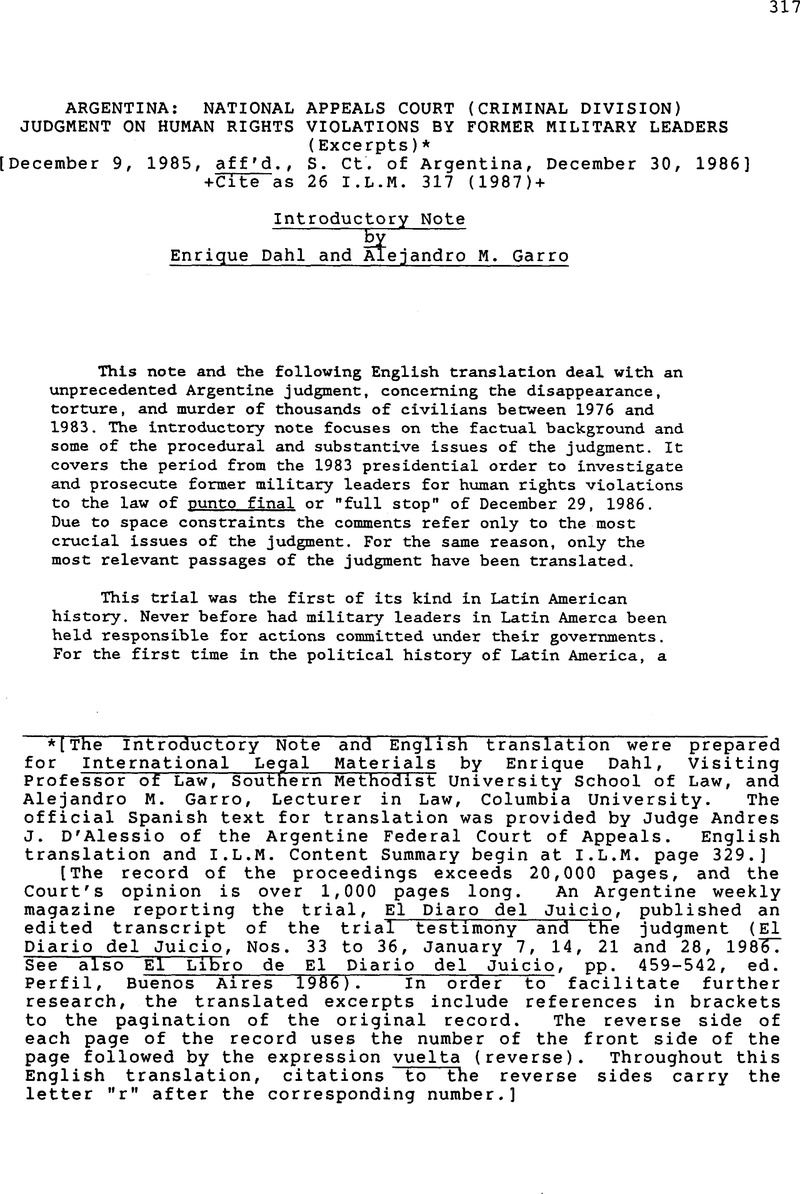Published online by Cambridge University Press: 27 February 2017

[The Introductory Note and English translation were prepared for International Legal Materials by Enrique Dahl, Visiting Professor of Law, Southern Methodist University School of Law, and Alejandro M. Garro, Lecturer in Law, Columbia University. The official Spanish text for translation was provided by Judge Andres J. D'Alessio of the Argentine Federal Court of Appeals. English translation and I.L.M. Content Summary begin at I.L.M. page 329.]
* There is an English translation of the Argentine Criminal Code (partly out of date),The Argentine Penal Code. published by American Series of Foreign Penal Codes, translated by E.Gonzalez Lbpez(London, 1963).
** For a study of the legal strategies adopted by the President and his advisers, the armed forces,and the human rights organizations in Argentina, see Osiel, The Making of Human Rights Policy in Argentina: The Impact of Ideas and Interests on a Legal Conflict. 19 J.Lat.Amer.Stud. 135-178 (1986).
* A general description of the administration of criminal justice in Argentina, under the rules of the Argentine Federal Code of Criminal Procedure, can be found in A.Carrié Criminal Justice in Argentina (An Overview for American Readers)to be published shortly by Louisiana State University Press, Baton Rouge, La.
* Three of the four who were acquitted of human rights violations were found guilty in an unrelated judicial proceeding regarding their mismanagement of the conflict with the United Kingdom over the Malvinas Falkland Islands in 1982.
* Judge Guillermo Ledesma,the presiding judge of the Federal Appeals Court which handed down the judgment against the former commanders, resigned shortly after President Alfonsin proposed the new law (El Informador Public.December 19,1986,p.21).
* pie judgment made an examination of numerous other cases that are omitted in this translation.]
* Article 144 bis of the Argentine Penal Code provides: “Jailing Fprisi6n1 or imprisonment [reclusidn] from one to five years and special disqualification Finhabilitacidn especial for twice that period of time shall be imposed on: (1) Any public official who, misusing his powers, or without acting according to the formalities prescribed by law,deprives anybody of his personal liberty.“
*** Article 18 of the Argentine Constitution of 1853 reads in part: “No inhabitant of the Nation shall be punished without previous trial founded on a law antedating the act for which he is tried, nor shall he be tried by special commissions, or removed from the jurisdiction of the judges desiganted by law prior to the commission of the offense with which he is charged. No one can be compelled to be a witness against himself; nor arrested except on an order in writing from an authority of competent jurisdiction….“
* The first paragraph of Article 144 ter of the Argentine Penal Code, as amended by Law No.23.077, reads: “Imprisonment or jailing from eight to twenty-five years and absolute perpetual disqualification shall be imposed upon any public official who inflicts any kind of torture on persons who are legitimately or illegitimately deprived of their freedom. The mere de facto power fpoder de hechol over the victim suffices for the commission of the crime; it is irrelevant that the victim be under the jurisdiction of the public official. The same punishment shall be applied to private individuals fparticularesl who commit this crime.
* Paragraphs (2) and (6) of Article 80 of the Argentine Criminal Code read: “Life imprisonment or jailing shall be imposed notwithstanding the application of Article 52, upon anybody who kills another:….(2) treacherously, by reason of brutal perversity, poison,or by any other cruel means….(6) with the intentional aid concurso premeditado1 of two or more persons.“
** Article 164 of the Argentine Penal Code reads: “The illegal appropriation of movable property, belonging totally or partially to another, by using force on the chattel or physical violence on a person, whether such violence has taken place before the robbery to facilitate it, or during or after the robbery to assure its success, shall be punished by jailing from one month to six years.“
*** Art. 140 of the Argentine Penal Code reads: “Anybody who reduces another to serfdom or to any similar condition, and anybody who receives this person, in such a condition, in order to maintain the person in it, shall be punished by imprisonment or jailing from three to fifteen years.“
* Paragraphs(6)and(7) of Article 34 of the Argentine Penal Code read: “The following are not criminally liable:…
1. Anybody acting in defense of his person or rights under the following circumstances:
a unlawful aggression,
b rational need of the means employed to prevent or avert aggression,
c absence of sufficient provocation on the part of the defender. [….]
2. Anybody acting in defense of the person or rights of a third party, provided that circumstances (a)and(b) of the previous paragraph exist, and that there has been sufficient provocation on the part of the victim,and there has been no involvement of the defender.“
2 [see footnote on following page]
* [In its judgement,the Court refers totheinternational treaties ratified by Argentina, including the Hague Conventions for the peaceful settlement of international disputes of 1899 and 1907 and the Treaty of Versailles of June 28,1919. The Court cites Argentine adherence to the Geneva Conventions of August 12,1949 for the treatment of the wounded and sick in armed forces in the field,for the treatment of the wounded, sick and shipwrecked members of armed forces at sea,for the treatment of prisoners of war, and for the protection of civilian persons in time of war,and notes Argentine ratification of the charter of the United Nations (done June 26,1945,ratified in 1946), the Charter of the Organization of American States (done April 30,1948,ratified in 1956) and Argentine support of the United Nations General Assembly Universal Declaration on Human Rights of 1958.]